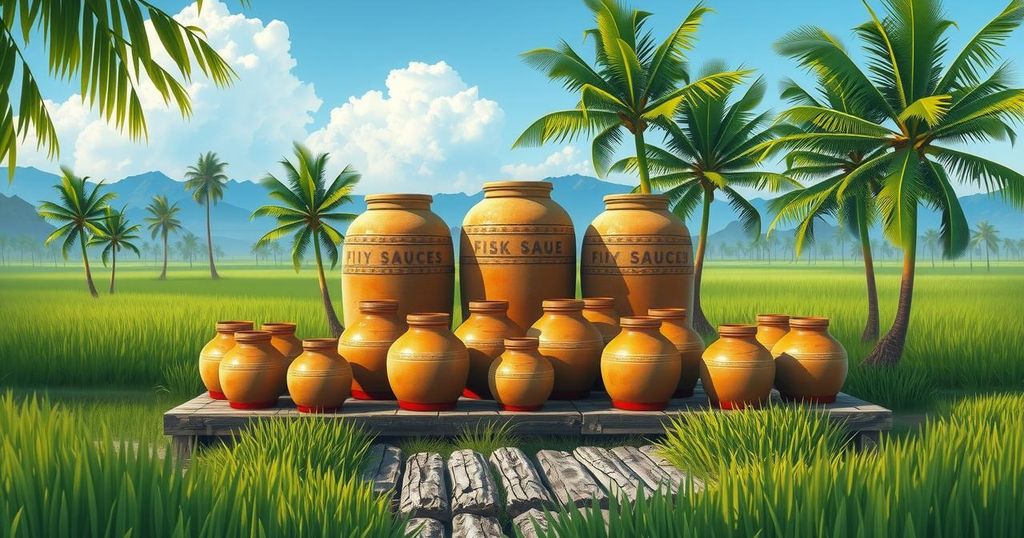Climate Change and Overfishing Endanger Vietnam’s Traditional Fish Sauce Heritage
The article discusses the impact of climate change and overfishing on Vietnam’s traditional fish sauce production, which has significant cultural and historical importance. It highlights the challenges faced by producers like Bui Van Phu, who aim to preserve their craft amidst declining anchovy populations and rising costs. Furthermore, it addresses the global fish sauce market’s growth potential, emphasizing the need for sustainable practices to ensure the tradition’s viability.
Bui Van Phong faced a critical decision at the end of the Vietnam War: to remain in his village and continue the family tradition of making fish sauce or to seek a better life abroad. He chose to stay and has developed a fish sauce business that is now in its fourth generation, led by his son, Bui Van Phu. According to Phu, this family tradition embodies not just culinary quality but also rich historical significance.
However, the heritage of traditional fish sauce is increasingly threatened by climate change and overfishing, alongside competition from mass-producing conglomerates. Difficulties in sourcing anchovies, essential for fish sauce, are being exacerbated as warming oceans and depleted oxygen levels hinder their populations. Research indicates that sustained deoxygenation will adversely impact anchovies, indicating dire ecological consequences.
The declining health of marine ecosystems and an increase in less nutritious fish could potentially escalate fishing costs and affect food supplies. Anchovies play a pivotal role in this ecological network, serving as a key food source for larger fish and providing fish meal for aquaculture. Tensions in the South China Sea, which contributes to about 12% of global fish catches, are complicating management of fish populations.
Historical fishing practices such as industrial bottom trawling, prevalent since the 1980s, have resulted in stagnated fish catches despite increased fishing efforts. A recent assessment reveals that even if global warming is limited and fishing intensity is decreased, over 20% of fish stocks in the South China Sea will still be lost. In a more severe scenario, nearly complete fish disappearance is predicted.
Phu, who also works as an information technology teacher, diligently maintains the age-old craft of fish sauce production. Anchovies are typically caught between January and March, and the preparation involves careful fermentation processes lasting up to 18 months. The specific combination of fish and seawater, along with other personalized recipes, greatly influences the sauce’s flavor.
Unfortunately, anchovy availability is declining, leading many traditional producers to contemplate exiting the business due to the rising prices. The evolving market prospects indicate that the global fish sauce industry is expected to grow significantly by 2032, with Vietnam positioned as one of the largest exporters aiming for improved food safety standards.
Fish sauce is an integral part of Vietnamese culture, profoundly affecting those living abroad and connecting them to their heritage. Different families have unique recipes, and the cultural debates over which brand is superior are ubiquitous. Phu hopes to pass down the heirloom craft of fish sauce making to his own son, emphasizing the need for a sustainable anchovy population to keep this tradition alive. He stated his belief, “Fish sauce to me is not just a condiment for cooking. But it is our craft, our culture, our tradition that need to be preserved, safeguarded, and inherited.”
The tradition of fish sauce production in Vietnam is threatened by environmental challenges, particularly climate change and overfishing. Despite its cultural significance and the family legacy of producers like Bui Van Phu, fishing difficulties and rising costs jeopardize this heritage. The global market for fish sauce presents opportunities for growth, yet sustainable practices must be addressed to ensure the survival of this culinary tradition for future generations.
Original Source: www.usnews.com




Post Comment